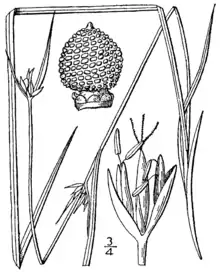Scleria pauciflora
Scleria pauciflora, known as few-flowered nutrush, papillose nut-sedge, and Carolina-whipgrass, is a plant in the sedge family (Cyperaceae) native to northern Mexico, the eastern United States, southern Canada, and Cuba.[2][3] It is common across a broad stretch of the southeastern United States in many different habitat types, becoming rare at the northern end of its distribution.[4]
| Scleria pauciflora | |
|---|---|
 | |
| 1913 illustration[1] | |
| Scientific classification | |
| Kingdom: | Plantae |
| Clade: | Tracheophytes |
| Clade: | Angiosperms |
| Clade: | Monocots |
| Clade: | Commelinids |
| Order: | Poales |
| Family: | Cyperaceae |
| Genus: | Scleria |
| Species: | S. pauciflora |
| Binomial name | |
| Scleria pauciflora Muhl. ex Willd. | |
Taxonomy
It was first formally described in 1805.[5] Three varieties are accepted:[2]
- Scleria pauciflora var. caroliniana Alph.Wood
- Scleria pauciflora var. curtissii (Britton) Fairey
- Scleria pauciflora var. pauciflora
Conservation status
It is listed as endangered in Massachusetts and Michigan and as threatened in Ohio, Pennsylvania, and Rhode Island.[3] In Canada, it is only known from Ontario, where it is listed as an S1 species (Critically Imperiled).[4]
The variety Scleria pauciflora var. caroliniana is listed as endangered in Connecticut.[6]
References
- Britton, N.L., and A. Brown. 1913. An illustrated flora of the northern United States, Canada and the British Possessions. 3 vols. Charles Scribner's Sons, New York. Vol. 1: 350.
- "Scleria pauciflora Muhl. ex Willd". Plants of the World Online. Royal Botanic Gardens, Kew. Retrieved 27 December 2019.
- "Plants Profile for Scleria pauciflora (fewflower nutrush)". plants.usda.gov. Retrieved 26 December 2019.
- "Comprehensive Report Species - Scleria pauciflora". explorer.natureserve.org. Retrieved 27 December 2019.
- "Scleria pauciflora Muhl. ex Willd". ipni.org. International Plant Names Index. Retrieved 27 December 2019.
- "Connecticut's Endangered, Threatened and Special Concern Species 2015". State of Connecticut Department of Energy and Environmental Protection Bureau of Natural Resources. Retrieved 24 December 2019.